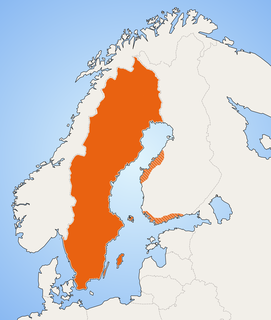The Reconstruction Finance Corporation (RFC) was a government corporation administered by the United States Federal Government between 1932 and 1957 that provided financial support to state and local governments and made loans to banks, railroads, mortgage associations, and other businesses. Its purpose was to boost the country’s confidence and help banks resume daily functions after the start of the Great Depression. The RFC became more prominent under the New Deal and continued to operate through World War II. It was disbanded in 1957, when the US Federal Government concluded that it no longer needed to stimulate lending.
Emerging in the first half of the 1980s, Swedish hip hop was first heard from the cities of Stockholm and Malmö. In the early days, most rappers in Sweden rapped in English. Funkalics and The Latin Kings, two very different acts united by their innovative use of the Swedish language, debuted a decade later and paved the way for a second, and bigger, breakthrough for Swedish hip hop. Today, some of the most popular rappers use Swedish, often in different accents.
The Dun & Bradstreet Corporation is a company that provides commercial data, analytics, and insights for businesses. It is headquartered in Short Hills, a community in Millburn, New Jersey, U.S. The company offers a wide range of products and services for risk and finance, operations and supply, and sales and marketing professionals, as well as research and insights on global business issues, serving customers in government and industries such as communications, technology, strategic financial services, and retail/telecommunications/manufacturing markets. Often referred to as D&B, the company's database contains more than 300 million business records worldwide.
The Swedish Language Council is the primary regulatory body for the advancement and cultivation of the Swedish language. The council is partially funded by the Swedish government and has semi-official status. The council asserts control over the language through the publication of various books with recommendations in spelling and grammar as well as books on linguistics intended for a general audience, the sales of which are used to fund its operation. The council also works with the five official minority languages in Sweden: Finnish, Meänkieli, Yiddish, Romani and Sami alongside the Swedish Sign Language.
Swedish National Export Credits Guarantee Board is a Swedish government agency that answers to the Ministry for Foreign Affairs. The agency is located in Stockholm.
Baron Israël Karl-Gustav "K-G" Eugène Lagerfelt was a Swedish diplomat.
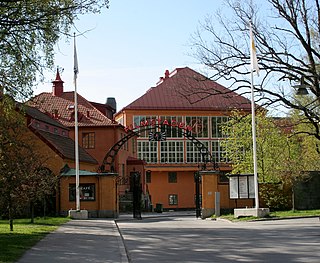
SF Studios is a Swedish film production company, distributor and movie theatre chain based in Stockholm, Sweden and owned by the Bonnier Group. The largest film studio in Sweden, it was established on 27 December 1919 as Aktiebolaget Svensk Filmindustri or Svensk Filmindustri (SF), and adopted its current name in 2016.

The Saga of Gösta Berling is a 1924 Swedish romantic drama film directed by Mauritz Stiller and released by AB Svensk FAB Svensk Filmindustri, starring Lars Hanson, Gerda Lundequist and Greta Garbo in her domestic film breakthrough. It is based on Swedish Nobel Prize-winning author Selma Lagerlöf's 1891 debut novel of the same name. The film is also known as Gösta Berling's Saga, The Story of Gösta Berling and The Atonement of Gösta Berling.
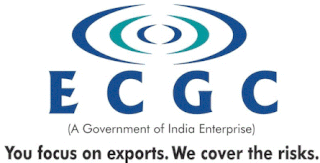
The ECGC Limited is a company wholly owned by the Government of India based in Mumbai, Maharashtra. It provides export credit insurance support to Indian exporters and is controlled by the Ministry of Commerce. Government of India had initially set up Export Risks Insurance Corporation (ERIC) in July 1957. It was transformed into Export Credit and Guarantee Corporation Limited (ECGC) in 1964 and to Export Credit Guarantee Corporation of India in 1983.
The Hong Kong Export Credit Insurance Corporation was established in 1966 under the Hong Kong Export Credit Insurance Corporation Ordinance. It was created by statute with the aim of encouraging and supporting export trade by providing Hong Kong exporters with insurance protection against non-payment risks arising from commercial and political events. Its contingent liability under contracts of insurance is guaranteed by the Government of the Hong Kong Special Administrative Region, with the statutory maximum liability currently standing at $55 billion. The Corporation is required to operate in accordance with the requirements laid down in the Hong Kong Export Credit Insurance Corporation Ordinance and to pursue a policy directed towards securing revenue sufficient to meet all expenditure properly chargeable to its revenue account. It is a 'public body' under the Prevention of Bribery Ordinance. HKECIC staff are not permitted to accept any advantages from HKECIC customers. Anybody offering any advantages to HKECIC staff in connection with official business commits an offence.
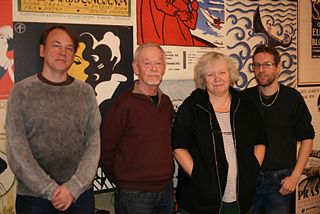
The Swedish Film Database is an internet database about Swedish films, published by the Swedish Film Institute. It contains information about all Swedish films from 1897 onwards and foreign films that had cinema premiere in Sweden. It also provides a lot of biographies of actors, directors, producers etc. who participated in Swedish films over the years. It is created with the support of the Bank of Sweden Tercentenary Foundation. The database comprises about 62,000 films and 265,000 people.

Accelerated Return Notes (ARN) were debt securities offered by Merrill Lynch from 2010 to 2012 and due in 2013 that were linked to gold spot prices.
Guenerina is a song written by Paul Paljett and Monica Forsberg and originally recorded by Paul Paljett on the 1977 album Mumbo Jumbo. The song stayed at Svensktoppen for 11 weeks from 17 April- 10 July 1977, topping the chart seven times.
Det är advent or Ett litet barn av Davids hus, is a Swedish Advent song with lyrics written by Britt G. Hallqvist in 1966 and music by Olle Widestrand. Music is often mentioned to have been published in 1981, but sources say the tune is older, and was in use already in the 1970s, as the song is published in Swedish 1977 children’s songbook Smått å Gott.
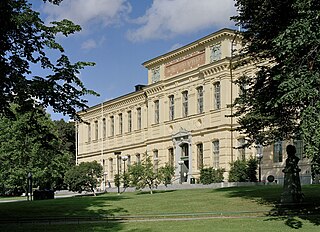
Svensk mediedatabas is a search engine for the audiovisual works of the National Library of Sweden.
Tryggare kan ingen vara is a Christian song with lyrics by Lina Sandell circa 1850, and published in 1855 Andeliga daggdroppar, where the writer was credited as anonymous. It was recorded by Carola Häggkvist in 1998 on the album "Blott en dag". It has also been used in the film soundtrack for the 1987 film "More About the Children of Noisy Village".
Har du glömt is a song written by Jan Askelind and Conny Modig. It was originally recorded by Wasa on the 1975 album Wasa 1975, recorded on the Polar Music record label, and also released as a single in July that year.

Swedish Elite Football, is a Swedish interest organisation that represents the 32 elite football clubs in the top two divisions of the Swedish football league system. SEF does not administer the divisions but acts in cooperation with the Swedish Football Association, the member clubs, sponsors and partners. The goal is to develop Swedish elite football resultwise, economically, commercially and administratively.
